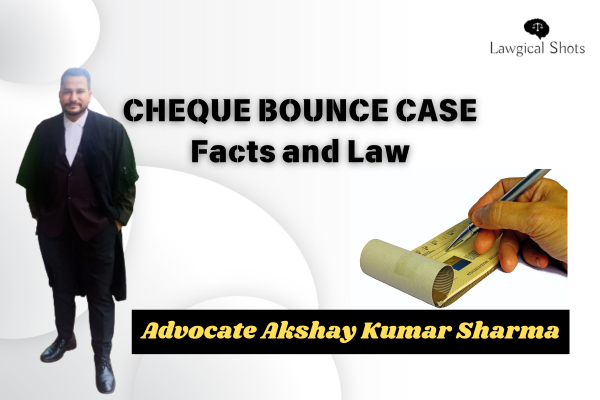If you have ever heard about cheque bounce, you must be aware of the legal implications which accompany the term. To protect the financial interests of people engaged in financial transactions through cheques, Section 138 of the Negotiable Instruments was made a criminal provision, punishing those who fail the payment success due to insufficiency of funds, etc. While things may sound very much clear, when it comes to representing a client before the Court, Advocates face certain challenges, have a closer look at the what actually happens, both in the Court as well as the parties in such cases. To help our readers understand the nitty gritty of cheque bounces cases from a legal practitioner’s lens, Ms Ridhi Khurana had a conversation with Advocate Akshay Kumar Sharma to fetch some illuminating insights. Here is a glimpse of doubts bowled at Advocate Akshay and his take on the same.
Discussion with Advocate Akshay on Cheque Bounce Case Facts and Law
1. Why are cheque bounce cases on a rise, taking a toll on the pendency before the Courts in India?
Adv Akshay Kumar Sharma: There are many factors for the rise in the number of Cheque Bounce cases. The primary reason is the increase in use of cheques as a mode of payment. Moreover, lack of awareness is also there among people, regarding the legal complications of cheque dishonour. Another reason is that many individuals miss out on ensuring about having sufficient funds, either deliberately or due to financial crunch.
2. While digital modes of payments like Google Pay, PayTM, Phone Pe are there, are people still dealing in cheques?
Adv Akshay Kumar Sharma: Yes, people are dealing in cheques more as compared to UPI transactions. Because at the end of the day, people know their liability through the banks with cheque payments. In fact, there have been many frauds done through UPI transactions. Because of such reasons, most of the people are going for payments through cheques for businesses as compared to UPI payments.
3. Is there a trend among clients approaching you for cheque bounce matters? For example, profession, age, etc.
Adv Akshay Kumar Sharma: Mostly, people who are business owners, traders, professionals are involved in cheque bounce matters. Professionals like Contractors who outsource usually take payments through cheques only. Property dealers are taking cheques, and even service professionals like advocates and others take cheques more often. The MSMEs are also going with payments through cheques only.
4. What is that one thing which people miss out on to produce as evidence in cheque bounce cases?
Adv Akshay Kumar Sharma: One crucial evidence which clients often overlook is the documents which could prove for admission of Negotiable Instruments Act cases in the Court. They skip on maintaining proper records, like providing the invoices, business contracts, agreements, etc. People are involved in businesses while lacking knowledge that they may sooner or later be involved in cheque bounce cases, running on trust basis only. Businesses have not hired professionals like accountants to keep the records or automatically prepare bills for them. In the absence of such documents, they would not be able to prove their case before the Courts.
5. What are the things which a person should take note of while drawing a cheque, so as to avoid the clutches of Section 138 of NI Act?
Adv Akshay Kumar Sharma: As discussed earlier, people are engaging in drawing cheques but not keeping sufficient funds. So the primary aspect to avoid the clutches of Section 138 of NI Act, there should be sufficient amounts in their accounts while issuing a cheque. Another important point is that since the last 2-3 years, there has been a rise in drawing post-dated cheques. So these should be avoided unless utterly necessary. Even if such cheques are drawn, people should ensure they have sufficient amounts on the said date. There is another crucial pointer, to maintain a record of documents through which they are dealing with the other parties. For example, they should keep the invoices, provide agreements, have ledger accounts maintained, so that when the other party sends a legal notice for cheque bounce, or say anything about payments not made, parties can easily present such documents to avoid fake cases.
Also, there is an increasing number of people who are not keeping records of cheques as well. While drawing a cheque, the drawer should keep a record of the reason for issuing a particular cheque against the cheque no. along with the date of issuance. In case of a lost cheque, one can always complain to the police regarding such missing cheque so that nobody is able to misuse the same under Section 138 of NI Act. There is another easy way out in case of shortage of funds in the bank account, to have a direct communication with the payee, while making some alternate arrangements. .
6. What are the challenges that you face while dealing with clients?
Adv Akshay Kumar Sharma: People are very much unclear about the law pertaining to cheque bounce under Section 138 of the NI Act. Some assume that they can initiate criminal proceedings for transactions through RTGS, IMPS, online or offline transactions, while the same is confined to cheque bounce, and other matters go for recovery through civil suit. People need to be educated on this aspect and understand this basic difference under Section 138 of NI Act. As a legal practitioner, it sometimes takes a lot of effort to explain to the clients that the information they get from Google may not always be verified, and it’s not always necessary that a person with legal knowledge is providing that information. Verified sources are never the problem but prove to be helping hands for lawyers like us.
7. What is the scope for settlement in cheque bounce cases?
Adv Akshay Kumar Sharma: In cheque bounce cases, the chances of settlement are high. Because these days, most of the people do not want to be indulged in lengthy Court cases. The best part about settlement in cheque bounce cases is that they can be settled at any stage, like pre-mediation, during the trial, and also when they are about to have the final judgment. When parties go for settlement, it is a win-win situation for both. Because when the complainant files a case, he/she is entitled to 20% of the amount at the beginning, which needs to be deposited with the Court by the defendant. Hence, the complainant is in a better position in such cases as there is scope for interest as well, which can be negotiated to avoid loss to either party. Even Courts encourage parties to go for settlement in cheque bounce cases.
8. Do you have any suggestions for the law pertaining to cheque dishonour under the NI Act?
Adv Akshay Kumar Sharma: Well, since there is huge pendency of cheque bounce cases before the Courts, my suggestion would be to introduce stricter timelines in cheque bounce cases for each stage. For example, there should be a proper channel for mediation along with a deadline, say 3 months to get the favourable results. If it is pre-mediation, there should be a time limit of 3-4 months. This may help achieve the desired results. There must be a faster mechanism for serving cheque bounce notices as well. It is a relief after COVID-19 pandemic that the possibility for serving summons/notices online through WhatsApp or email. In addition, since we go for Alternative Dispute Resolution (ADR) for industrial disputes, it should be mandatory for suitable matters like that of NI Act. It may prove to be more efficient with comparatively more convenience. There is scope for ending the enmity as well which may sprout among parties due to non-payment through cheque.








